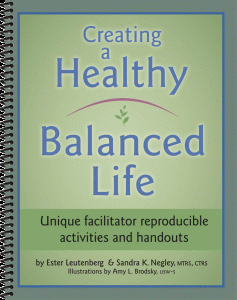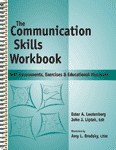 Poetry exercises excerpted from Creating a Healthy Balanced Life
Poetry exercises excerpted from Creating a Healthy Balanced Life
By Sandra K. Negley, MTRS, CTRS and Ester Leutenberg
Looking for an interesting way to lead your clients as they explore their thoughts and feelings? Something different and introspective? Try poetry.
Poetic Thoughts and Feelings – exploring through poetry
One creative way to explore thoughts and feelings is through the writing of poetry. Don’t worry, this does not mean a person has to be a great poet or writer to have fun with this unique and ancient art form. The key is to be open, enjoy, explore, and look soulfully at one’s deeper thoughts and feelings. Writing poetry can assist a person to focus thoughts, stop circular thinking, and begin to look at life from a different perspective. A variety of creative writing techniques will work with most people and most ages; here are four styles to initiate participants’ creative thinking.
Technique #1
Haiku is a unique ancient Japanese style of writing that uses 17 syllables divided into 3 lines of 5, 7 and 5 syllables.
Example:
River flows gently
Water moves sand and rock
Forgiveness begins
Technique #2
Five-line poetry while similar to Haiku is less restrictive and for some allows a more creative exploration.
Title of Topic (1-word) Describe Topic (2 words) Action Occurring (3-words) Feelings—how it makes you feel (4-words) Summary (1-word)
Example:
Friendship
Honesty, acceptance
Evolving through time
Creating more fulfilled experiences
Forever
Technique #3
Pass Around Poem
A fun exercise in poetry writing can come from a less threatening approach that lends itself to creative and critical thought. This opens the door for participants to have interesting and inquisitive discussions on the coincidences in life.
Instructions: Distribute one poetry book, a pen, and one piece of paper to each participant. Instruct participants that when you say, “start” they will follow this process:
- Close your eyes
- Open the book
- Place one finger on a spot in the book
- Open your eyes
- Write a line of poetry from where your finger landed (one line)
- Give participants an example
The facilitator gives participants 30 seconds and then says “pass.” Participants will pass their book to the right and repeat the process. The number of lines of the poem will be determined by the number of participants. (Keep in mind some people may need more time than others, waiting can be unsettling and/or break the magic with boredom. Consider facilitating with smaller groups.)
Technique #4
An I Am Poem can be used as an introspective exercise for participants to increase self-awareness while also connecting with other members of the group. The I Am Poem is a creative way to also teach and explore current issues, science, art, and conceptual thoughts. There are two ways to approach this form of writing:
Form One — Instruct the participants that to write this poem only requires one instruction; each line of the poem must start with “I am . . .” The poem can be as long as they choose and reflect as much about themselves as they would like to share. The poem may include such things as gender, ethnicity, interests, family traditions, mottos, memories, or future goals. Encourage participants to be creative in defining who they are and how they express themselves. Remind them that it does not have to rhyme.
Example Format:
I am a woman
I am multidimensional
I am strong and industrious
I am vulnerable and emotional
I am an advocate for individuals with disabilities
I am a listener
I am a mother, grandmother, teacher, friend
I am a woman
Form Two — This poem follows a more directed and structured format. Begin with the I am statement — two characteristics of the person. This statement can be repeated throughout the poem as a line opener and then repeated as the last line of the poem. The writer can have as many stanzas to their poem as they choose. As the facilitator, you can prepare a format for participants or you can list a variety of suggestions and let participants develop their own format.
Example Format:
I am (characteristics of the person)
I wonder (something the person or thing could think or be curious about)
I hear
I see
I dream
I am (If you wish repeat first line of the poem, every 4-5 statements)
I fear
I love
I understand
I hope
I am (end poem with this line)
Additional Suggestions
I care I feel I want I touch
I pretend I respect I cry I laugh
I worry I unfold I release I forgive
I say I hope I honor

